

2023/24
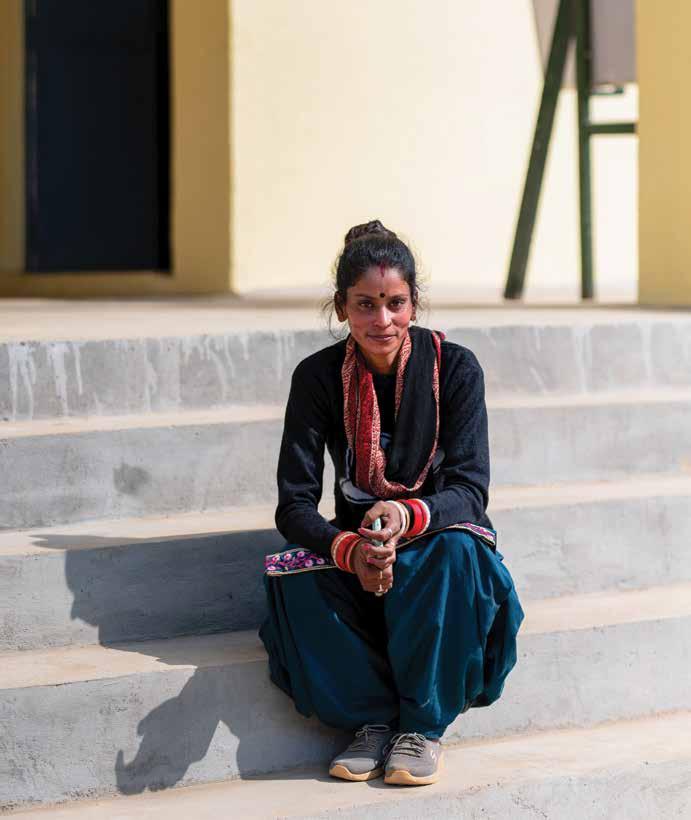
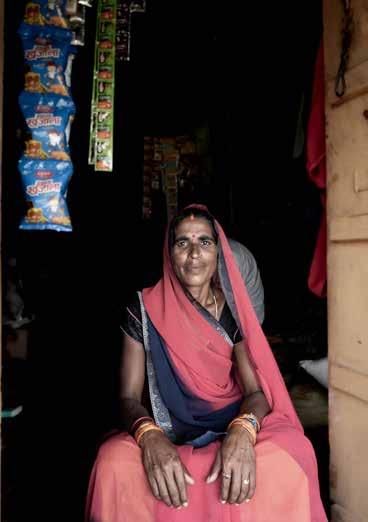



2023/24


2023-24
Published by: The Hunger Project, India
Design: Studio Eksaat
Cover Photo: Maya Arya, President, Nirai Gram Panchayat, Uttarakhand; Photo by Anurag Banerjee
Image above: Shakuntala Devi, 43, opens a small kiosk of an essential items shop inside her house. With the help of the ward member and community stakeholder meeting she was linked to the MP govt. loan scheme.
Declaration: In compliance and as mandated under Section 22 of The Sexual Harassment of Women at Workplace (Prevention, Prohibition and Redressal) Act, 2013, The Hunger Project, India hereby declares that no complaints of sexual harassment were reported to its Internal Committee for the year 2023-2024.
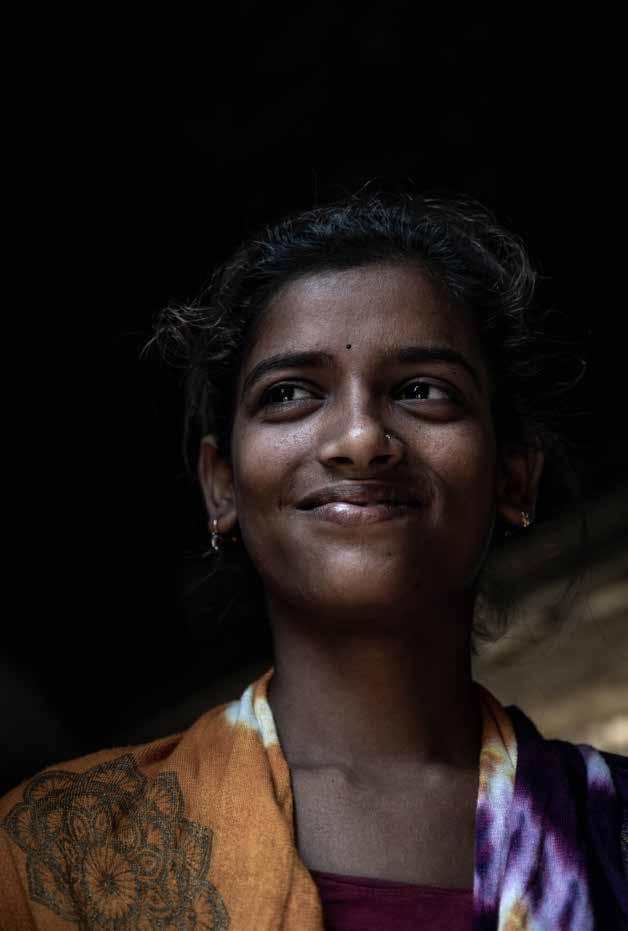
Since 2001, The Hunger Project has been working with Elected Women Representatives in Gram Panchayats (village councils) across India.
Currently, we are working in six states: Bihar, Karnataka, Madhya Pradesh, Odisha, Rajasthan, and Uttarakhand.
A world without hunger, a world where every human being leads a life with dignity and equality.
Our fundamental principles are

To strengthen women’s leadership in gram panchayats (village councils) so that they can perform effectively as public officeholders, practice good governance, and promote social and gender justice. Gender


Collaboration



2023 marked yet another proud and reflective moment for us as THP India continued its mission of empowering elected women representatives and adolescent girls in a way that exemplified our core values of gender equality, social justice, human dignity, transparency and accountability. We strengthened our capacities, sharpened our learnings and strategies, and committed to grounding the work in ensuring access to entitlements, rights and justice for the most vulnerable.
Looking back, we celebrate the team’s unwavering collective spirit and its courage to adapt, a quality that reassures us of our resilience and ability to overcome challenges. This adaptability has led to some significant highlights:
THP India continued to embrace new realities and opportunities. In what felt like a huge win and respite, THP India won its first-ever CSR grant for a new intervention focusing on raising awareness about nutrition, building community resilience, and improving institutional mechanisms ensuring food security. Regarding our ongoing work with empowering elected women representatives, we see, for instance, powerful sights of individual acts of the leadership of women and male sarpanches in Almora district, Uttarakhand and how strengthening their capacities has led and encouraged active citizenship engagement in panchayat governance. At the same time, in Karnataka, the SUGRAMA federation, the state-level collective of elected women representatives, resolved a long-standing
issue of accessing public bus service. It directly impacted approximately 25,000 people across ten-gram panchayats. Moreover, 200 students across 32 villages can continue regular school and college. 500 women now find moving easier and safer, including accessing livelihood opportunities.
In Bihar and parts of Karnataka, access to education, health, and livelihoods remains challenging for many rural girls. THP India worked tirelessly to bridge these gaps, enhancing girls’ skills and capabilities. As a result, we see passionate negotiations with families to continue school on the one hand and dialogue with local authorities to recognise their right to government entitlements and services on the other hand. From delaying marriage to improving school infrastructure to securing nutritional needs and ensuring safe mobility, adolescent girls are emerging as empowered and informed young citizens.
Throughout the year, the monitoring, evaluation, and learning team focused

on strengthening and streamlining existing systems to effectively capture the critical work done by elected women on the ground and measure the impact of interventions with adolescent girls.
Moreover, to ensure THP India is recognised as an important actor in gender and governance space, participating in different national and international spaces as thought partners remains critical to its more extensive efforts. We have endeavoured to share and enhance knowledge with new and old collaborators as we strive to build better social ecosystems on the ground.
As always, we thank the donor-investor community for their faith in our vision, strategies, and work. None of this would have been possible without their steady support and solidarity.
We continue to deliberate on our practices and lessons learned and respond to questions posed by a rapidly changing environment. With gratitude to our fabulous team, we move forward, remain intentional and resolute about our mission and vision, and explore new trails and trajectories!
THP India is a non-profit organisation committed to empowering women and girls in rural India. Foregrounded in the 73rd Constitutional Amendment of 1992, THP India has been working on strengthening the capacities of elected women representatives in gram panchayats. Over the last two decades, we have engaged with 1,97,000 women leaders.
THP India’s interventions have steadily aimed to build and bolster the leadership skills of elected women representatives. The core strategy is based on the premise that if elected women representatives in gram panchayats are imparted the knowledge, skills, and support to develop and strengthen their leadership, they become empowered to drive development in their panchayats and ensure social and gender justice for all citizens. They are better positioned to prioritise issues, plan budgets, and promote good governance. The intervention strategies are closely aligned with the five-year cycle of their tenure, with each year requiring focused engagement and input.
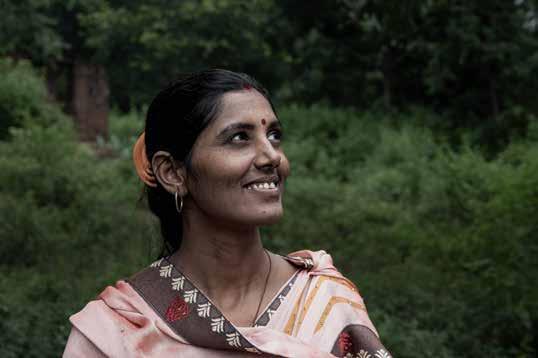
The strategy for elected women programme includes:

Strengthening capacities and leadership skills


Dialogue with local administration, state government, and the media
Fostering an enabling environment through the creation of support structures such as federations and jagruk manch (joint collective of elected women representatives and other women citizens) as spaces for co-learning and collective action
We currently work with 6221 elected women representatives across 959 panchayats in the five states of Karnataka, Madhya Pradesh, Odisha, Rajasthan, and Uttarakhand.
The adolescent girls’ strategy includes:



Building life skills and active citizenship
Today, they are exercising their leadership to ensure improved access to various rights, entitlements and government schemes - quality education, health services, food and social security, water, sanitation, electricity, forest conservation, and safe and violence-free panchayats.
Simultaneously, the adolescent girls’ programme in Bihar, Karnataka and Rajasthan continues its critical engagement in empowering adolescent girls and leveraging the public office of elected women to support them.
Our interventions remain committed to our vision of ensuring gender equality and a just society. We continue to explore new and innovative pathways that seek to amplify voice and agency and strengthen village practices of good governance, accountability, and transparency.
Interface with panchayat administration and government officials
Facilitating a vibrant learning environment through girls’ collectives
It’s a heartening shift in the way girls are empowered to use their voices to make decisions about different aspects of their lives and access rights, entitlements, and panchayat services. We see girls emerging as active citizens and leaders in their communities. Currently, the programme spans 88 panchayats in three states working with 3589 adolescent girls.
33 Districts / 54 Blocks / 1104 Panchayats / 5415 Elected Women Representatives / 2882 Adolescent Girls (Bihar and Karnataka)
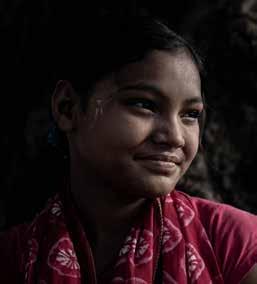

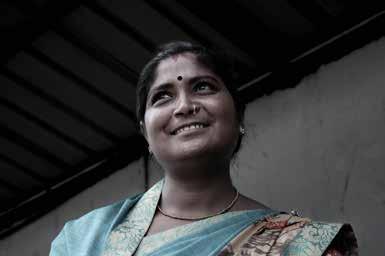
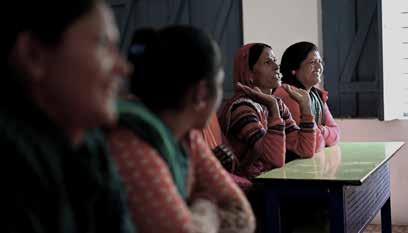
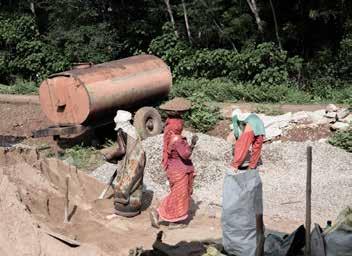
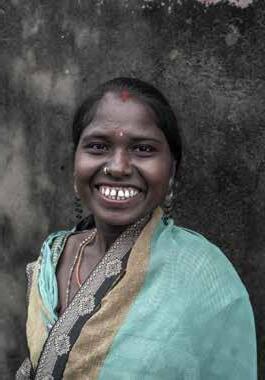
Renuka Dohar, 26, felt that a major benefit of attending the community multi-stakeholder meetings regularly was her learning about her local Self Help Group. Madhya Pradesh

Becoming self-aware, building the confidence to speak out, and finding one’s voice and agency are important measures of a long, tedious but rewarding process of empowerment. When manifesting in individual and collective acts of leadership, we see remarkable levels of change that remind us about the need to continue investing in building and strengthening women’s capacities to lead.
In light of this process, one locates THP India’s expansive work of strengthening women’s leadership capacities and skills in local governance. Their engagement
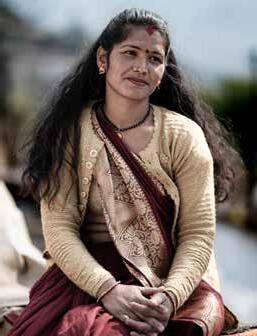
in institutions of local democracy like the gram sabha, school management committees and angadwadi commitees amongst others enhances their role as public office holders where they listen, engage and act upon myriad issues.
We witness how women’s presence in panchayats promotes dignity and affects social transformation. They embrace courage as they respond to local governance systems, ensuring access to welfare and entitlement schemes of government, monitoring health clinics, education, crèche centres, and ration
shops, addressing safe mobility for women and girls, and scripting legacies and futures with better possibilities for all, especially the most vulnerable and marginalised.
In Karnataka, continuous efforts of 25 SUGRAMA (state-level federation of elected women representatives) members enhanced people’s mobility and intervillage connectivity.
15-gram panchayats, in the southern districts of Chikkamagaluru and Shivamogga, not only resumed bus service, which had remained stalled for the past ten years, but new buses have been introduced on the routes to ensure people can access public spaces for work, learning, and leisure. This directly impacts approximately 25,000 people and covers a total distance of 116 km. Moreover, 200 students across 32 villages can continue regular school and college. 500 women now find moving easier and safer, including accessing livelihood opportunities.
The elected women acted on different fronts - relentlessly following up with the transport department officials, meeting MLAs of the respective districts, and submitting petitions to political parties in the May 2023 legislative assembly elections (leveraging the Karnataka government’s Shakti Scheme, which made travel on public buses free of cost for women).
“Our efforts have been rewarded. Children can attend school and college. Elderly members can easily access hospitals. Many of us who are SHG members can now easily get our raw materials like spices to make pickles and chutneys and earn a decent living,” said one of the women.
In Rajasthan, Kamla Bhil (President of Niwadi Gram Panchayat, Rajasthan) took upon the daunting task of governing her gram panchayat and addressing corruption in the delivery of services. As an Adivasi sarpanch, she has left no stone unturned to lead by example. In one such case where people were being denied access to food grains at affordable prices, she learned about many Sahariya (one of the poorest Adivasi tribes in the region) families in Vaskheda village not receiving free oil and pulses as per the PDS (Public Distribution System) scheme. She immediately escalated the matter to the sub-divisional officer during the Prashasan Gaon Ke Sang Campaign (“Administration Stands With Village,” a platform for resolving local issues), and it was resolved on the spot.
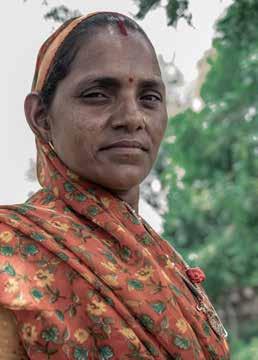
In Uttarakhand, Pushpa Bhandari, the witty and precocious van panchayat sarpanch of Jaicholi gram panchayat, and young and conscientious Kavita Negi one of the few MA graduates in the Ladura gram panchayat, have been working hard to protect forests and restoring local naulas, respectively.
“A common feature of Uttarakhand’s geographical landscape, naulas are traditional water harvesting systems. I created community awareness about how the naula met local communities’ domestic needs, and maintaining it meant the long-term health of the water body and those using it for various purposes. Close to 300 people access it.”
Similarly, Pushpa’s efforts saw a previously scantily covered hillside, which now boasts a proper green cover. “Approximately 200 people received employment as they were engaged in building boundary walls. If they grow grass, they can use it for their cattle fodder without buying it from outside at a higher price. Similarly, the pirul (fallen pine leaves) could be used to build animal shelters.”
All remain committed to educating communities, ensuring livelihood opportunities for people, and sustainably using local resources for many daily local needs while aiming to protect the fastbecoming fragile and hostile ecosystems.

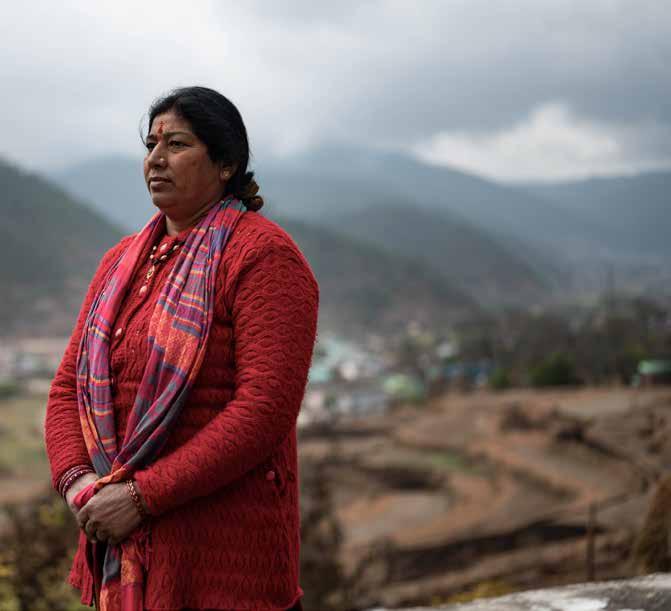
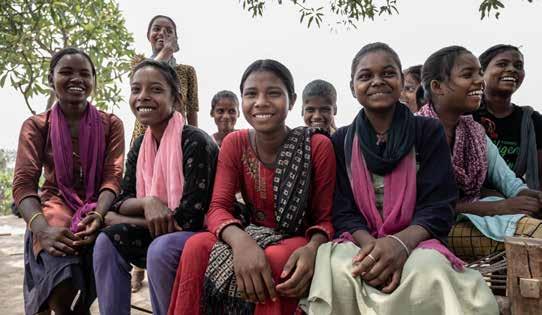
Over the past year, the adolescent girls’ programme has gained much depth as it continues to strengthen adolescent girls’ voices, agency, and choice. The twopronged approach combines elements of girl-centric leadership programming that promotes an empowered sense of self with a considered focus on making local governance institutions responsive to girls’ needs and rights.
In the context of Bihar, we see both girls’ agency and responsive institutional mechanisms coming into play. 28 adolescent girls from seven schools across four blocks raised their voices against caste-based discrimination in mid-day meal distribution. They raised the matter in School Management Committee meetings, after which the Block Education Officer intervened and took action against the cook.
Girls also advocated for small public libraries in their panchayats as another way to access education and leisure. 51 girls met with respective mukhiyas (village council presidents in Bihar) in six panchayats and urged them to facilitate this process. As a result of this demand, six rural libraries have been opened across these panchayats in Rohtas and Muzaffarpur districts. This must be seen as a massive boost to creating a conducive learning environment.
Another critical initiative, setting up kitchen gardens, was undertaken.
A total of 210 nutrition gardens were set up by adolescent girls across 35-gram panchayats.
“We learned about it during a Sukanya club meeting, which made me curious. It is a fun, creative task but also requires serious thinking around what fruits and vegetables we should grow,” said Himani from Marwan Block.
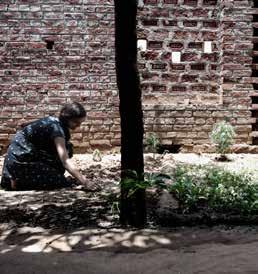
It is also an opportunity for many to rethink their food habits. Misha from Jhajha Block shared, “Growing our kitchen garden has also helped us as a family. My sister-in-law is pregnant, and she now has access to green vegetables regularly, and we are not dependent on the market.”
Similarly, in Karnataka, we see active shifts in how girls are seeking accountability and securing the possibility of a future for themselves. In a collective effort, 35 girls in Shikaripur block petitioned for a bus service between two panchayats to enable safe mobility to school. The girls first raised the matter in the Child Rights Protection Committee (an initiative by THP India at the gram panchayat level) meeting, pursued the elected woman representatives, and approached the transport department accompanied by field staff. Continuous follow-up on different fronts led to the provision of a private bus, which runs twice a day during school hours. In addition, a police patrol has been stationed closer to the school premises to check incidents of harassment on the way to school.
Furthermore, to ensure girls have access to higher education, THP India organised five career counselling sessions for classes 10th and 12th, which brought together 190 adolescent girls across four blocks. The sessions provided inputs on the various scholarships and financial support available for girls to pursue their education. Faculties from colleges, vocational coaching centres, including Government Tool Room and Training Centre (GTTC), computer institutes, paramedical colleges, etc., were invited to speak with girls, answer questions and share information on what these places offer.
The above examples highlight and stand as important testimonies to the success of a range of strategic interventions— leadership workshops, life skills education, forming peer collectives—that continue to deliver the information and skills girls need to make informed decisions about their lives. Through this process of knowledge building, the girls can participate and contribute to addressing social issues that affect them as active citizens in gram panchayats.
Improved access to affordable, especially nutritious food, is paramount to ensuring food security for all, particularly vulnerable and marginalised households.
In a newly started intervention in 820 villages across Madhya Pradesh, Karnataka, Odisha, and Rajasthan, the strategy essentially focuses on creating enhanced awareness of comprehensive nutrition, reflecting on existing traditional nutritional food practices and experiences, improving food availability, and ensuring the institutional mechanisms of panchayat governance are functional so that the community can leverage them to be food secure.
The end of the year saw launch meetings and awareness drives with community members, adolescent girls, and elected representatives. One of the key mediations came in the form of health camps, which played a critical role in providing medical care, creating awareness about healthcare, and promoting preventive healthcare, especially in distant rural areas. 134 camps were set up in the initial phase, reaching 8046 people across 97 gram panchayats. They are particularly crucial in preventing diseases and serious health conditions like anaemia and malnutrition, promoting support and building community resilience
by expanding people’s access to healthrelated information and systems, especially marginalised individuals and communities.
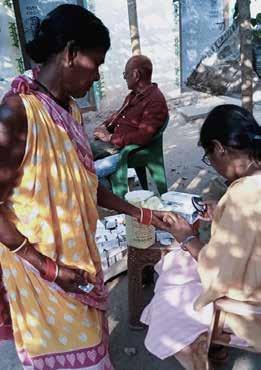
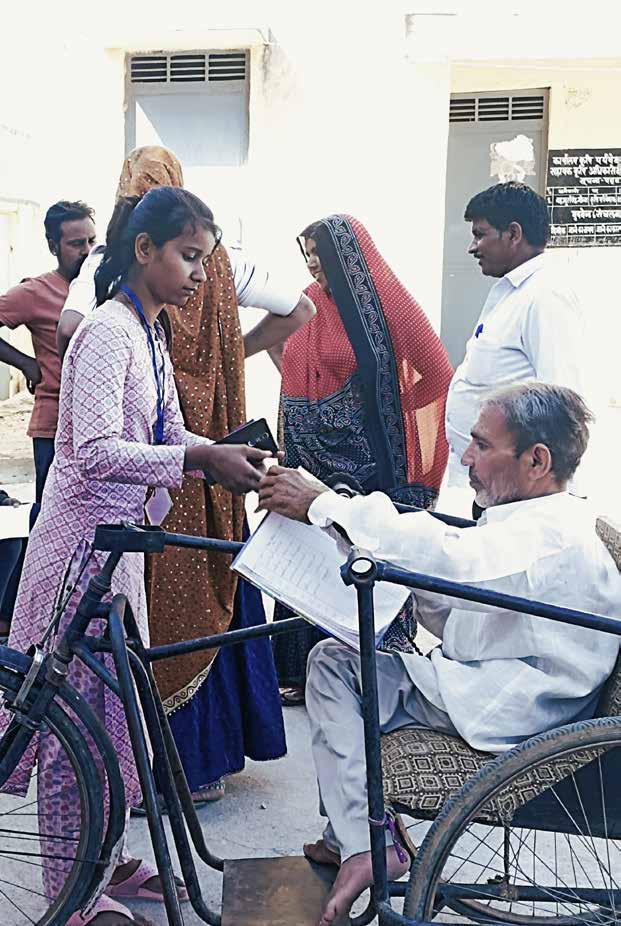
Workshops were held in Rajasthan and Uttarakhand.
A unique intervention that focuses on strengthening the capacities of panchayat presidents in their journey from representation to participation. These trainings have helped reinforce their vision for the future and the legacy they would like to leave behind.
Also known as technical trainings, were held in Madhya Pradesh, Karnataka, Rajasthan, Odisha, and Uttarakhand and attended by 3410 elected women. These meetings provide focused inputs on themes that may require deeper engagement. These included the significance of ward sabhas, mahila sabhas, and palli sabhas, understanding gram panchayat administrative processes and budgets, operating online portals to access social security schemes, and situating their work in the context of broader sustainable development goals.
In Madhya Pradesh, 432 interface meetings were organised between community members, elected women, and various government service providers on linkages with livelihood, improving the nutrition of mothers and children through participation in mothers’ committees, and intensive engagement with school management committees to address quality and access to education.
With the launch of the nutrition project, eight training sessions for trainers were organised to build the capacities and skills of 79 new field staff across four states: Madhya Pradesh, Karnataka, Rajasthan, and Odisha. The aim was to build a collective understanding of key themes related to engaging communities in nutrition, operationalising interventions and strategic plans for the duration of the project, and financial training.
As a strategic support structure at the local level, jagruk manches (women’s collectives) have been tremendously successful in raising awareness, mobilising and amplifying women’s voices and elected women’s participation in local governance. 621 such meetings were held in Karnataka and 2129 in Uttarakhand. Major themes included constructing new anganwadis, addressing issues of water, delays in issuing job cards under MGNREGA, access to social security schemes, proper utilisation of Village Health, Sanitation and Nutrition Committee’s funds, and installing street lights to ensure safe mobility for women and girls.

THP India produced two short films documenting the role of platforms like Jagruk Manch and the School Management Committee, respectively, in Uttarakhand. Both spaces endeavour to facilitate vital community participation in panchayat governance.

In Bihar, a three-day exposure visit was organised for 32 adolescent girls from Arwal, Muzaffarpur, Rohtas and Jamui. They visited the science centre and Bihar Museum and participated in a self-defence master class. They also met professional women from different walks of life - a young advocate, an artist and a woman farmer. As in the past, girls experienced multiple freedoms, such as the freedom to explore, express their creative energies, and move in public spaces, which fostered a more profound sense of confidence and enthusiasm for learning in the context of broader sustainable development goals.

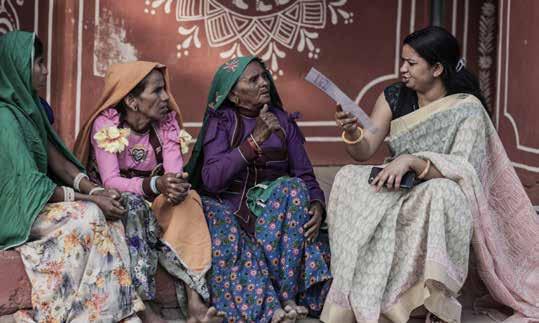
For women’s leadership to significantly impact local governance, there is a substantial need to advocate for promoting and protecting women’s rights in the larger socio-political discourse around women’s participation and representation in local democracy. Similarly, shifting power to girls and youth is necessary for authentic change.
In 2023, THP India gained momentum in its presence in critical spaces both at the national level and on global platforms. We have spoken about the intersections between access to leadership positions and democratic social change. We have come together with partners to amplify the voices of women and girls, exploring strategic alliances that would shape shape democratic dialogue around strengthening citizens engagement in panchayats.
Following are some of the key highlights of critical spaces attended:
THP India (programme staff and elected women representatives) participated in a national conference on ‘Local Democracy in India’ organised by the Azim Premji Foundation with over 250 people, including elected representatives, NGOs, and policymakers. Elected women from Uttarakhand and Karnataka shared their experiences of advancing local democracy principles as presidents and ward members.
THP India co-hosted a critical consultation on empowering and accelerating adolescent girls’ rights in partnership with AJWS-SETU Abhiyan. Approximately 56 people participated, including representatives from 12 grassroots organisations, elected representatives, girls, and government officials. There were strategy and programme experiences and learnings shared from Gujarat, Karnataka, Bihar, Himachal Pradesh, Maharashtra, Rajasthan and Madhya Pradesh and built a deeper understanding of the value of working within the local governance framework to advance girls’ rights and exploring opportunities to collaborate, network and adapt practices that can help empower, enable and amplify youth voices in panchayats.
THP India was invited to conduct lectures on Local Democracy and Development at Azim Premji University, sharing THP India’s strategy with MA in Development Studies students and NGOs across India.
Veda Bharadwaj (Associate Director) THP India participated in a half-day strategy meeting organised by NAWO and Friedrich-Ebert Stiftung, India, to discuss the recently passed Women’s Reservation Bill and the way forward. Civil society organisations were in attendance, elected women representatives from Maharashtra, Chandigarh, and Rajasthan, and office bearers from major political parties.
Surbhi Mahajan (Senior Programme Officer) participated in a webinar, “Female Empowerment: Essential in the Fight against Poverty and Hunger”, hosted and moderated by THP Germany as part of their #16DaysofActivism campaign highlighting the importance of women’s empowerment and its multiple, positive spillover effects.
In Karnataka, SUGRAMA federation’s state level steering committee members met Uma Mahadevan, the Additional Chief Secretary, Rural Development Panchayati Raj, and presented critical demands related to regularising panchayat meetings, honorariums to elected women without a gap, constituting a sexual harassment committee as per the Karnataka PRI Act, and other functional issues related to the general administration of panchayats.
THP India’s monitoring, evaluation, and learning (MEL) priorities focused on strengthening existing systems and field teams’ capacities and building efficient ways of capturing data and outcomes. Data visualisations, data walks, and evaluations remain crucial in establishing robust learning and feedback loops and, documenting impact and leveraging evidence to inform programme strategies and advocate for transformative change.
10,002
Households linked to ration cards
13,102
Children enrolled into ICDS centres
1,931
PDS shops monitored
2,198
Malnourished children enrolled in NRCs
1,209
Primary health centres monitored by EWRs
10,586
Toilets constructed
1,702
Appointments of doctors, nurses, and other staff across health centres
94,816
New water connections
Girls enrolled in any higher education facility (after 12th) with the support of EWRs
Children linked to scholarships or other schemes with the support of EWRs
29,618 4,414
No. of people linked to MGNREGA (Job cards and work accessed)
No. of people received housing
Child marriage cases addressed by EWRs
Illicit liquor shops closed
638 14,345 20,147 12,785 1,172 3,617 27,000 2,033 20,529 13,882
Children enrolled into schools
Girls who had dropped out re-enrolled into the formal education system
No. of people linked to pensions (single women, old age, widows, differently abled)
Domestic violence cases addressed by EWRs
Streetlights installed
Petitions to improve the quality of services across ICDS, schools, and health centres submitted by EWRs
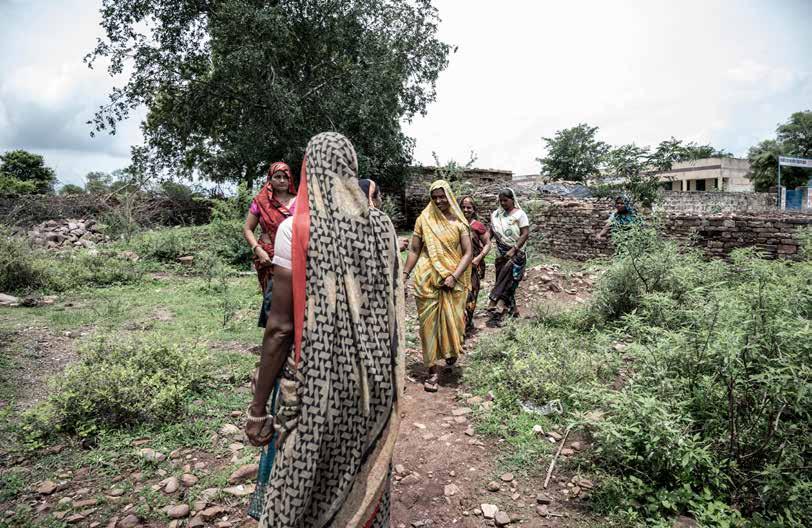
We have audited the financial statements of The Hunger Project-India (the Trust), which comprise the balance sheet at March 31st 2024, and the Statement of Income and Expenditure for the year then ended, and notes to the financial statements, including a summary of significant accounting policies.
In our opinion, the accompanying financial statements give a true and fair view in accordance with the Accounting Standards issued by the Institute of Chartered Accountants of India (ICAI) in the case of:
a. Balance sheet, of the state of affairs of the trust as at 31 March 2024, and
b. Statement of Income and Expenditure, of the excess of Expenditure over Income for the period from 1 April, 2023 to 31 March, 2024.
We conducted our audit in accordance with the Standards on Auditing (SAs) issued by ICAI. Our responsibilities under those standards are further described in the Auditor’s Responsibilities for the Audit of the Financial Statements section of our report. We are independent of the entity in accordance with the ethical requirements that are relevant to our audit of the financial statements under fair presentation framework, and we have fulfilled our other ethical responsibilities in accordance with these requirements. We believe that the audit evidence we have obtained is sufficient and appropriate to provide a basis for our opinion.
Management is responsible for the preparation and fair presentation of the financial statements in accordance with the aforesaid Accounting Standards, and for such internal control as management determines is necessary to enable the preparation of financial statements that are free from material misstatement, whether due to fraud or error.
In preparing the financial statements, management is responsible for assessing the entity’s ability to continue as a going concern, disclosing, as applicable, matters related to going concern and using the going concern basis of accounting unless management either intends to liquidate the entity or to cease operations, or has no realistic alternative but to do so.
Those charged with governance are responsible for overseeing the entity’s financial reporting
Our objectives are to obtain reasonable assurance about whether the financial statements as a whole are free from material misstatement, whether due to fraud or error, and to issue an auditor’s report that includes our opinion. Reasonable assurance is a high level of assurance, but is not a guarantee that an audit conducted in accordance with SAs will always detect a material misstatement when it exists. Misstatements can arise from fraud or error and are considered material if, individually or in the aggregate, they could reasonably be expected to influence the economic decisions of users taken on the basis of these financial statements.
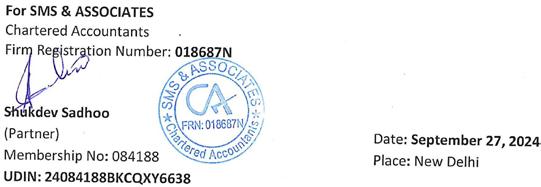
Funds
Summary of significant accounting policies 1 As per our separate report of even date attached

PARTICULAR’S
TOTAL INCOME
Grants and Donation Received
Statement of Income and Expenditure Account for the year ended March 31, 2024 10,27,31,795 1,27,30,944 11,54,62,739 10,59,92,538 1,13,09,126 11,73,01,664
TOTAL EXPENDITURE
Other Income Administrative and General Expenses
Other Expenditure on Objects of the Trust
Depreciation and Amortization Expenses
Surplus/ ( Deficit) for the year to be transferred to general fund 2,76,61,479 9,43,51,821 7,75,447 12,27,88,747 (73,26,008) 2,49,95,348 9,76,50,136 9,21,714 12,35,67,198 (62,65,534)

The Hunger Project is a Charitable Trust established on 28th March 1984 registered under the Bombay Public Trust Act 1950 vide registration number F-9598(BOM).
The Hunger Project was registered u/s 12A of the Income Tax Act, 1961 to claim full exemption from Income Tax u/s 11 & 12 of the Income Tax Act, 1961 being charitable. The Finance Act 2020 has introduced new sub section 12AB by eliminating Section 12A and has mandated to every registered charitable organization for re registration under section 12AB of the Income Tax Act 1961. The trust has received the new registration certificate under section 12AB of the Income Tax Act 1961 vide registration number AAATT0359BE20214 dated 28.05.2021 valid till Assessment Year 2026-27
The Hunger Project was also registered u/s 80G of the Income Tax Act, 1961. The Finance Act 2020 has mandated that the charitable institutions registered under section 80G of the Income Tax Act 1961 are required to re-apply only for approval. The trust has received the new registration certificate under section 80G of the Income Tax Act 1961 vide registration number AAATT0359BF20214 dated 28.05.2021 valid till Assessment Year 2026-27
The Hunger Project is also registered under Foreign Contribution (Regulation) Act, 2010 (“FCRA”) vide registration no 083780474 dated 03rd May 2001. The validity of existing registration is valid till 30.09.2029.
The Hunger Project is a global strategic organization committed to the ending of hunger. In India it is committed to ignite, kindle and sustain the leadership spirit in women elected to village Panchayats. The 73rd Amendment to the Indian Constitution which mandated 33.3% reservation for women, SC and STs in all three tiers of the Panchayati Raj Institution, has brought more than one million women into public political life. It is our conviction that active participation of these women in local governance will make hunger free India a reality.
i.Basis of Accounting
The Accounting Standards issued by the Institute of Chartered Accountants of India are applicable to non-profit entities, only if any part of the activities of the entity is considered to be commercial, industrial or business in nature.
The trust is not carrying on any activity in nature of commercial, industrial or business, therefore the Accounting Standards are not mandatory and have been followed to the extent practicable or relevant.
The financial statements have been prepared under the historical cost convention on an accrual basis except stated otherwise. The accounting policies have been consistently applied by the society except stated otherwise.
ii.Cash and cash equivalents:
Cash and cash equivalents include cash in hand, balance with bank fixed deposit and government bond having maturity less than three months. Fixed deposit and bond having maturity more than three months but less than 12 months has been classified as other bank balances.
iii. Investment
Fixed deposit and Bonds having maturity more than 12 month has been classified under Investment.
iv. Revenue Recognition
a) Earmarked Grants are initially credited to a Liability account in the Balance Sheet and are transferred to Income and Expenditure Account in the year in which and to the extent to which the Trust complies with the conditions attached to them.
b) Interest on savings accounts are transferred to respective grant account only in case it is written specifically in the agreement else directly treated as Income.
c) Donation and Interest income is recognized in the year of receipt
d) Fund Received from foreign source are kept in designated bank account and separate books of account are also maintained as per Foreign Contribution (Regulation) Act 2010 and rules made thereunder.
v. Foreign Currency Transactions:
The Trust has received foreign contributions in accordance with the provisions of Foreign Contribution (Regulation) Act, 2010 read with FCRA Rules, 2011. The foreign contribution received has been accounted for in the books on the basis of advice issued by the banker. The exchange rate mentioned in the advice copy is taken as conversion rate for the purpose of converting foreign contribution in Indian Rupee.
vi. Expenses:
Direct costs associated with specific programs are recorded as direct program expenses.
vii. Employee Benefits:
a) Short Term Benefits: Short term employee Benefits are accounted as an expense in the Income and Expenditure Account in the year in which the payments are made.
b) Post-Employment Benefit Plans: Contributions to Provident Fund are recognised as an expense in the Income and Expenditure Account when the employees have rendered services entitling them to contribution.
c) Gratuity;Gratuity is defined benefit scheme. The charge in the income & expenditure account for gratuity is based on the actuarial valuation by a independent actuary. Further as per the trust policy, the amount of gratuity payable to an employee shall not exceed INR 20,00,000/-.
a) Fixed Assets are stated at written down value in the financial statements.
b) No revaluation of fixed assets was made during the year.
c) The gross block of fixed assets is capitalized at cost which includes taxes and duties and other identifiable direct expenses attributable to acquisition of fixed assets up to the date.
d) Depreciation is provided on the written down value method mainly at the following rates:
The Trust is registered under Section 12AB of the Income Tax Act, 1961, vide registration certificate dated 28/05/2021 which entitles it to claim an exemption from income tax provided certain conditions laid down in the Income Tax Act 1961 are complied with. Provision for tax will be made only in the year in which the Trust is unable to establish reasonable certainty of its ability to fulfill these conditions.
The Project generally enters into cancelable operating leases for office premises normally renewable on expiry. Rent expenses relating to operating leases for the year ended March 31, 2024 are Indian Rupees 35,63,338 /- (Previous Year Indian Rupees 3,105,152/-).
xi. Investment:
Fixed deposit and Bonds having maturity more than 12 month has been classified under Investment.
xii. As per the Governing Council meeting dated, October 27, 2023, the Governing Council approved the allocation of INR 2.5 Crore from the reserves for the implementation of THP’s ongoing programme activities and other administrative cost.
xiii.
a) As per estimation of Trust management, there is no contingent liability.
b) No prior period items taken into account during the year
c) The rest of the accounting policies are consistent with the generally accepted Accounting Policies.
d) Previous year’s figures have been regrouped or rearranged whenever necessary.
i. Expenses are generally disclosed as per the program budget heads.
ii. There is no such income which is of a business nature as defined under section 2(15) of the Income Tax Act, 1961
iii. The organization has duly complied with the provisions of Foreign Contribution (Regulation) Act, 2010 as well as Foreign Contribution (Regulation) Amendment Act 2020 while finalizing the books of accounts relating to foreign funds.
iv. In view of the stay order granted by Hon High Court of Mumbai and on the basis of information gathered from various sources, in respect of payment to be made, to the Commissioner Charity under Bombay Public Trust Act, 1950, the trust has not made a provision @ 2 % for the amount being an uncertain /unconfirmed liability for the year.
v. Pending Legal Case/Contingent Liability; There is no legal cases pending or initiated during the year either by any individual or organization against The Hunger Project.
vi. Balances receivable/payable to donors as on March 31, 2024 are subject to confirmation from respective donors.

Governing Council:
Pari Jhaveri, Chairperson
Preeta Lall, Treasurer
N.K. Malhotra, Secretary
Krishna Menon, Member
Kaadambari, Member
Debarpita Banerjee, Member
Ayush Chauhan, Member
Amit Goyal
Bharani Sundararajan
Bhushan Giri
Darshan Surendranath
Ganga Gupta
Kanika Kaul
Md. Moazzam
Naveen Verma
Nidhi Kumari
Paritosh Sasmal
Ruchi Yadav
Shiw Shankar Mahato
Subrata Sahoo
Surbhi Mahajan
Varsha Chaudhary
Veda Bharadwaja
Vicky
*The list is in alphabetical order
State Teams:
Bihar: Shahina Perween, Ratan Kumar, Sanju
Karnataka: Somashekhar A., Padmini Ananth, Vinodh P., Lavanya V. S
Madhya Pradesh: Shibani Sharma, Nitendra Gupta, Shriram Kevat
Odisha: Sukanta Mohapatra, Harihar Debata, Bimal Sahu
Rajasthan: Virendra Shrimali, Astha Rastogi, Renuka Sharma, Janmejay Shriwas, Mahendra Patodia
Uttarakhand: Kamla Bhatt, Himanshu Sati, Dheeraj Kumar
We are grateful to our donors for their support and solidarity
American Jewish World Service
Azim Premji Foundation
CITI Bank
Mariwala Charitable Trust
THP Australia
THP Germany-BMZ, Germany (The Federal Ministry of Economic Cooperation and Development)
THP Netherlands
THP Sweden
New Delhi
11/1, Sarvapriya Vihar, New Delhi – 110016
Ph: 01141688847/40519106/40519075
Bihar:
House No. – 102, Road No. - 21, Shri Krishna Nagar, Patna - 800001
Ph: 0612-2521705
Karnataka:
Sree Guruvayurappan, No. 25/1/1, 6th Cross, Athmananda Colony, Sultanpalya, R.T. Nagar Post, Bangalore - 560 032
Phone: 080-23554580
Madhya Pradesh:
MIG-136, Bagmugaliya Extension, Housing Board Colony, Bhopal - 462043
Ph: 0755-2424736
Odisha:
D-14, Harekrushna Villa, Botanda, Sunderpada, Khordha - 751002
Ph: 09124908977
Rajasthan:
C-4, Ground Floor, Hari Marg, Civil Lines, Jaipur - 302006
Ph: 0141-2223123
Uttarakhand:
C-1, Chandra Mauli, J. K. Puram, Mukhani, Haldwani - 263139
Ph: 05946-280188
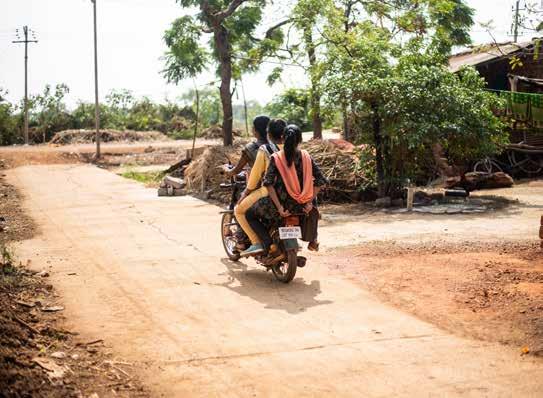


2023/24
@thehung er projectindia
Th e Hung er Project India
@THP_Ind
thehun ge rp rojectindi a
http://thpindia.or g